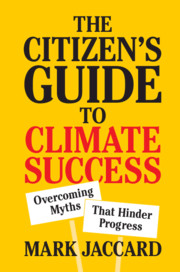Book contents
- The Citizen’s Guide to Climate Success
- Advance Praise for The Citizen’s Guide To Climate Success
- The Citizen’s Guide to Climate Success
- Copyright page
- Dedication
- Contents
- Figures
- Acknowledgments
- Chapter 1 The Role of Myths in Our Climate-Energy Challenge
- Chapter 2 The Art of Deluding Ourselves and Others
- Chapter 3 Climate Scientists Are Conspirators
- Chapter 4 All Countries Will Agree on Climate Fairness
- Chapter 5 This Fossil Fuel Project Is Essential
- Chapter 6 We Must Price Carbon Emissions
- Chapter 7 Peak Oil Will Get Us First Anyway
- Chapter 8 We Must Change Our Behavior
- Chapter 9 We Can Be Carbon Neutral
- Chapter 10 Energy Efficiency Is Profitable
- Chapter 11 Renewables Have Won
- Chapter 12 We Must Abolish Capitalism
- Chapter 13 The Simple Path to Success with Our Climate-Energy Challenge
- Notes
- Bibliography
- Index
- References
Bibliography
Published online by Cambridge University Press: 06 February 2020
- The Citizen’s Guide to Climate Success
- Advance Praise for The Citizen’s Guide To Climate Success
- The Citizen’s Guide to Climate Success
- Copyright page
- Dedication
- Contents
- Figures
- Acknowledgments
- Chapter 1 The Role of Myths in Our Climate-Energy Challenge
- Chapter 2 The Art of Deluding Ourselves and Others
- Chapter 3 Climate Scientists Are Conspirators
- Chapter 4 All Countries Will Agree on Climate Fairness
- Chapter 5 This Fossil Fuel Project Is Essential
- Chapter 6 We Must Price Carbon Emissions
- Chapter 7 Peak Oil Will Get Us First Anyway
- Chapter 8 We Must Change Our Behavior
- Chapter 9 We Can Be Carbon Neutral
- Chapter 10 Energy Efficiency Is Profitable
- Chapter 11 Renewables Have Won
- Chapter 12 We Must Abolish Capitalism
- Chapter 13 The Simple Path to Success with Our Climate-Energy Challenge
- Notes
- Bibliography
- Index
- References
- Type
- Chapter
- Information
- The Citizen's Guide to Climate SuccessOvercoming Myths that Hinder Progress, pp. 277 - 285Publisher: Cambridge University PressPrint publication year: 2020
- Creative Commons
- This content is Open Access and distributed under the terms of the Creative Commons Attribution licence CC-BY-NC-ND 4.0 https://creativecommons.org/cclicenses/

